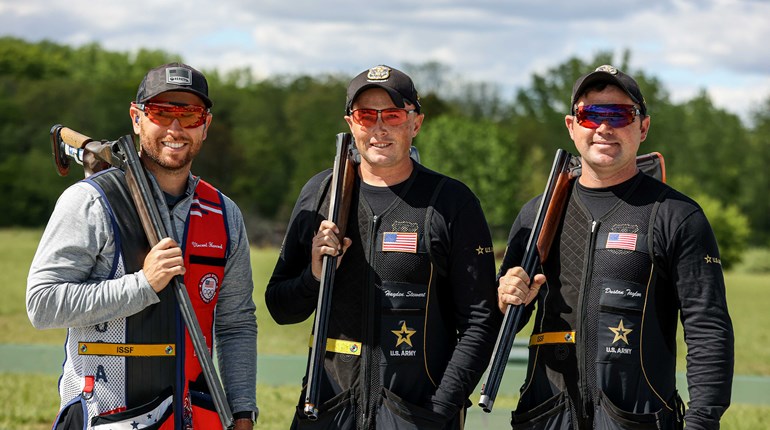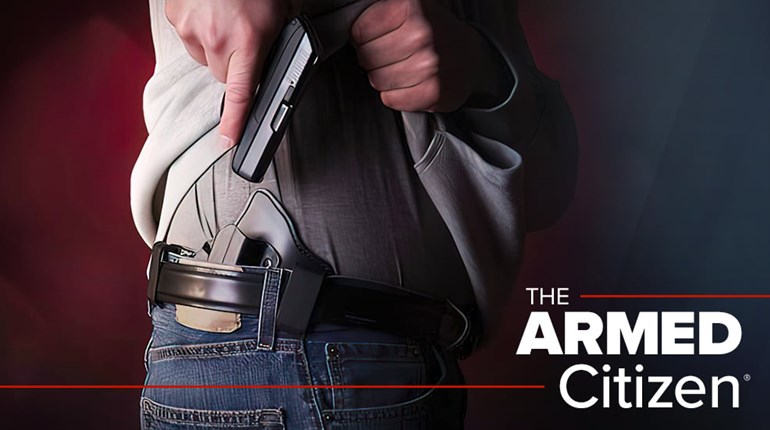
This feature appears in the June ’16 issue of NRA America’s 1st Freedom, one of the official journals of the National Rifle Association.
If you’ve seen the Academy Award-winning movie “No Country for Old Men,” you’ll remember the chilling scene where the drug cartel assassin—who had just committed two horrific, brutal murders—walks into a lonely gas station on the windswept Texas plain and menacingly asks the owner, “What’s the most you ever lost on a coin toss?”
We in the audience realize that if the elderly proprietor calls “heads” or “tails” wrong, he’s sure to be murdered as well.
In the same way, your one vote in this year’s election might mean the difference between a pro-gun U.S. Supreme Court that upholds your right to keep and bear arms—or an anti-gun Supreme Court that denies your Second Amendment-protected right to defend yourself and your family. In other words, it’s do-or-die for your freedom and your safety. Here’s why:
With the sudden death in February of Supreme Court Justice Antonin Scalia—the most passionate and principled defender of the Second Amendment in the Supreme Court’s history—our one-vote majority on the court in favor of gun rights is gone.
Four current justices believe law-abiding Americans like you have the individual right to own a gun for self-defense, including handguns—and four justices do not.
As NRA-ILA Executive Director Chris W. Cox wrote in The Washington Post, that means that if President Barack Obama’s nominee to the Supreme Court, Judge Merrick Garland, is confirmed, it could result in the end of individual gun ownership in the United States.
That’s no exaggeration. As NRA Executive Vice President Wayne LaPierre put it, “Judge Garland’s actions on the federal bench cut to the very heart of the Second Amendment as an individual right.” U.S. Sen. Charles Schumer, for example, calls Garland “almost the ideal candidate.”
How? First of all, as you know, the Supreme Court’s landmark Heller decision, which ended the Washington, D.C., gun ban by confirming that you have an individual right to own a handgun to defend yourself in your home, was a 5-to-4 split decision.
Justice Scalia voted in the majority and wrote the majority opinion. Now, with the loss of Justice Scalia, the court is deadlocked 4-to-4.
How Judge Garland Voted Against Your Individual Rights
So where does Obama’s nominee, Judge Garland, stand on that crucial case? How would he cast the tie-breaking vote if he replaced Justice Scalia?
It’s easy enough to see. Because Garland did vote—twice—as a member of the D.C. Circuit Court of Appeals on that very issue as it moved through the courts.
First, in 2005, when plaintiffs sued to lift the D.C. gun ban, a three-judge panel on the D.C. Circuit held in Seegars v. Gonzales that the plaintiffs lacked standing. In other words, they ruled that the lawsuit could not proceed, leaving the D.C. gun ban in force.
When those plaintiffs asked the D.C. Circuit to reconsider the case en banc—in other words, for the entire court, rather than just a three-judge panel, to decide—Judge Garland voted against rehearing the case. In effect, his vote was to let the D.C. gun ban stand, thereby rejecting the plaintiffs’ argument that the Second Amendment protects an individual right to keep and bear arms.
But Garland wasn’t merely deferring to a previous court decision. Because two years later, the judge was more than happy to reconsider an earlier court decision.
That was in the case of Parker v. District of Columbia, in which a three-judge panel of the D.C. Circuit found that the Second Amendment does indeed guarantee an individual right to keep and bear arms, and that therefore the D.C. ban on handguns, which violated this right, was unconstitutional.

This time, when the D.C. government petitioned to have the case reheard by the entire D.C. Circuit, rather than just a three-judge panel, Judge Garland voted in favor of rehearing the case. And let’s be clear on what that means. Judges do not vote to rehear decisions on which they agree. So by voting for the full Circuit to rehear the case, Garland was effectively trying to get the Parker decision overturned.
In short, Garland voted to respect precedent when it upheld the D.C. gun ban—but revisit precedent when it overruled the D.C. gun ban. He wanted to have it both ways—just as his backers do today.
Political Hypocrisy: How Garland’s Backers Want It Both Ways
Now, the Obama administration and its media cheerleaders have tried to argue that these votes don’t really mean anything when it comes to your Second Amendment-protected rights. They’ve tried to portray them as academic, technical questions that hinge on arcane issues of legal procedure.
But that’s a sham, and they know it. It is nothing more than an attempt to confuse people. Unfortunately for them, the facts are the facts, no matter how the gun control crowd tries to pretend otherwise.
In the same partisan, hypocritical way, Obama and the anti-gun Democrats pushing Garland’s appointment are trying to convince the public that U.S. senators who oppose Garland—or who want to wait until after the election to give the American people a say in the process—are somehow failing to live up to their constitutional duty.
Of course, that ignores the words of the Constitution itself, which vest the authority to approve judicial nominations with the U.S. Senate.
Some Of Garland’s Backers Are The Most Anti-Gun Politicians In D.C.
Let’s look at a few of Judge Garland’s loudest backers—who also happen to be some of the heaviest hitters of the anti-gun movement.
U.S. Sen. Charles Schumer, D-N.Y., for example, calls Garland “almost the ideal candidate.”
Sen. Dianne Feinstein, d-Calif., trumpeted Garland’s virtues in USA Today. Her fellow Californian and gun-ban ally, Sen. Barbara Boxer, praised him in The [San Jose] Mercury News.
John Feinblatt, the head of Michael Bloomberg’s anti-gun group Everytown for Gun Safety claims, “Nothing about Garland’s resume sheds any light whatsoever on how he views guns or the Second Amendment.” Oh really? If that’s the case, then why would Feinblatt, as a leader of the gun control lobby, devote more than 700 words in a Washington Post opinion piece promoting Garland?The head of Michael Bloomberg’s anti-gun group Everytown for Gun Safety claims, “Nothing about Garland’s resume sheds any light whatsoever on how he views guns or the Second Amendment.” Oh, really?
Dan Gross, president of the Brady Campaign gun-ban lobby, called Garland “a justice who may side with constitutional, sensible gun laws”—presumably by rewriting the definition of “constitutional.”
Vice President Joe Biden defended Garland’s nomination and insisted the Senate hold hearings, saying, “In the time we nominated Chief Judge Garland, nobody has questioned his integrity. Nobody has questioned his scholarship. Nobody has questioned his open-mindedness.” And Senate Minority Leader Harry Reid, who has obstructed Supreme Court nominations in the past, slammed Republicans for not immediately giving Garland a hearing, saying, “They’re going to wind up as a result of this foolishness losing Senate seats they shouldn’t have lost. I’m kind of glad they’re doing it, but it’s so foolish.” On “Meet the Press,” Reid later said, addressing Garland, “This is going to break. You’re going to become a Supreme Court justice.”
But for the ultimate guide to Garland, you only need to consider who nominated him—Obama.
For the past seven years, Obama has told us how much he understands and respects the Second Amendment—while pushing every kind of anti-gun scheme he can think of. He claimed his first Supreme Court nominee, Sonia Sotomayor, was a moderate on the gun issue, and Sotomayor claimed that it was “settled law” that the Second Amendment protected an individual right. Yet as soon as she was confirmed, she voted in McDonald v. Chicago to deny the right to keep and bear arms to everyone outside of Washington, D.C.!
As Cox summed it up: “President Obama has nothing but contempt for the Second Amendment and law-abiding gun owners. Obama has already nominated two Supreme Court justices who oppose the right to own firearms, and there is absolutely no reason to think he has changed his approach this time.”
How Garland On The Supreme Court Could Gut Firearm Freedom
For America’s 100 million gun owners, Obama’s choice of Garland may be the most dangerous Supreme Court nomination ever. Because the truth is, we could lose everything we’ve fought to achieve over the past 30 years.
Just ask Supreme Court Justice Ruth Bader Ginsburg. In 2009, she gave a lecture to the Harvard Club of Washington, D.C., titled “The Role of Dissenting Opinions.” In that speech she said the value of dissenting opinions is that they “appeal to the intelligence of a future day, when a later decision may possibly correct the error.”
As an example of such an error, Justice Ginsburg specifically cited the Heller case that established the Second Amendment as your individual right. She said she looks forward to a time when the Court can revisit some of its recent 5-to-4 decisions ... like Heller.
So what would life look like in America if Judge Garland is confirmed to the Supreme Court, and the Court overturns the Heller decision that Garland repeatedly voted to stymie?
If you don’t have a right to own a gun in your own home to protect yourself and your family, then where would you be “allowed” to own a gun? In your car? In public? On the street? Anywhere? What could be more sacrosanct than your self-defense in your own home? Make no mistake: The “slippery slope” could become a vertical drop if Garland gets a lifetime appointment to the highest court in the land—or if anti-gun forces retain control of the White House.
Since the Heller dissenters all agreed that the D.C. gun ban, “which focuses upon the presence of handguns in high-crime urban areas, represents a permissible legislative response,” then presumably any and all handgun bans in “high-crime urban areas” would be “permissible.”
And depending on how the government defines “high crime,” those supposed “gun-free zones”—where, of course, only the criminals are armed—could grow to encompass the country.
If you don’t think that could happen, remember that it’s already happened once in American history. For many years, in most of the country, the right to carry was effectively forbidden. The pendulum of history could very well swing back.
Make no mistake: The “slippery slope” could become a vertical drop if Garland gets a lifetime appointment to the highest court in the land—or if anti-gun forces retain control of the White House.
Your Vote This Year Is All That Can Save The Second Amendment
You may not have a voice or vote to affect the critically important cases that come before the courts in this country.
You may not be able to directly control who sits on the U.S. Supreme Court.
But you do have a vote—and a duty to use it—to choose the president who nominates, and the U.S. senators who reject or confirm, the judges who determine the strength and scope of your right to keep and bear arms.
It’s all you have and it’s everything you have—and everything hinges upon it this year.
So if you believe in your individual right to own a gun to protect yourself and your family—or for any other lawful purpose—then do your part to defend it.
If you agree with the Founding Fathers and framers of the Constitution—and with millions of lawful, peaceable Americans—that the right to keep and bear arms is a God-given birthright that keeps our families safe and keeps our country free, then vote for that freedom, above, beyond and before everything else.
Or you could find that your one vote—or your failure to cast that one vote—could cost you everything.

































